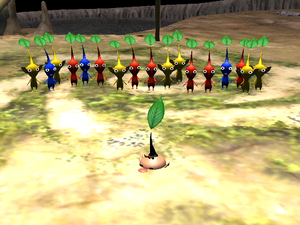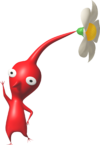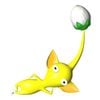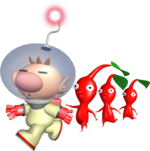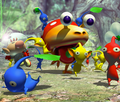Pikmin (game): Difference between revisions
(Improved sentence about Switch port) |
(Fixed Italian interlanguage link) |
||
| (46 intermediate revisions by 26 users not shown) | |||
| Line 1: | Line 1: | ||
{{page title|''Pikmin'' (game)}}{{game icons|p=y}} | {{page title|''Pikmin'' (game)}} | ||
{{game icons|p=y}} | |||
{{Infobox game | {{Infobox game | ||
|name=Pikmin | |name=Pikmin | ||
| Line 14: | Line 15: | ||
|players=Single-player | |players=Single-player | ||
|savesize=19 blocks | |savesize=19 blocks | ||
| | |successor=[[Pikmin 2]] | ||
|rerelease=[[New Play Control! Pikmin]]<br>[[Pikmin 1 (Nintendo Switch)]] | |rerelease=[[New Play Control! Pikmin]]<br>[[Pikmin 1 (Nintendo Switch)]] | ||
|jp={{date|26|October|2001}} | |jp={{date|26|October|2001}} | ||
| Line 21: | Line 22: | ||
|au={{date|14|June|2002}} | |au={{date|14|June|2002}} | ||
}} | }} | ||
{{redirects|Pikmin 1|the port that uses this name|Pikmin 1 (Nintendo Switch)}} | |||
'''''Pikmin''''' is the first | '''''Pikmin''''' is the first game in the [[Pikmin series|''Pikmin'' series]], released in 2001 as one of the first games available for the [[GameCube]]. The game is the first in the series chronologically, and sees [[Captain Olimar]] crash-landing on an [[PNF-404|unknown planet]] and collecting his missing [[ship part]]s in order to escape. The game introduces the main game mechanics of growing [[Pikmin family|Pikmin]], controlling the Pikmin as a group, taking down [[obstacle]]s, [[carrying]] objects, and battling [[Enemy|enemies]]. The game has been ported to the [[Wii]] under the title {{npcp1}}, and ported to the [[Nintendo Switch]] under the title [[Pikmin 1 (Nintendo Switch)|''Pikmin 1'']]. Its sequel, {{p2}}, was released three years later in 2004. | ||
==Plot== | ==Plot== | ||
{{spoiler}} | {{spoiler}} | ||
[[Captain Olimar]], a pilot, flies his spacecraft, the [[S.S. Dolphin]], through space. Suddenly, a meteor hurdles toward his direction and hits the Dolphin, sending it plummeting toward an {{w|Earth}}-like [[PNF-404|planet]]. During the fall, the Dolphin ignites, and its various [[Ship part|parts]] are released from the hull and scattered across the planet. | |||
The next morning, Olimar regains consciousness on [[The Impact Site]] and turns around to find | The next morning, Olimar regains consciousness on [[The Impact Site]] and turns around to find the Dolphin badly damaged. Realizing that the oxygen on the planet is deadly to his body and his life-support systems only have enough power to last 30 days, Olimar sets out to locate the missing parts of the Dolphin, hoping he can rebuild his ship and return to his home planet of [[Hocotate]]. | ||
After exploring a bit, Olimar finds a dormant [[Onion]]. Upon approaching it, it springs to life, and out comes a seed. Upon [[pluck]]ing it and experimenting with the creature by [[throw]]ing it, [[dismiss]]ing it, etc., he learns about the [[Pikmin family|Pikmin]] and their abilities. With the help of the [[Red Pikmin]] he raises, Olimar recovers the [[Main Engine]], which allows him to at least hover above the surface during the night, which he later learns is too dangerous. | After exploring a bit, Olimar finds a dormant [[Onion]]. Upon approaching it, it springs to life, and out comes a seed. Upon [[pluck]]ing it and experimenting with the creature by [[throw]]ing it, [[dismiss]]ing it, etc., he learns about the [[Pikmin family|Pikmin]] and their abilities. With the help of the [[Red Pikmin]] he raises, Olimar recovers the [[Main Engine]], which allows him to at least hover above the surface during the night, which he later learns is too dangerous. | ||
| Line 38: | Line 39: | ||
!Click [show] to display the image. | !Click [show] to display the image. | ||
|- | |- | ||
|[[File:Olimar Pikmin.png| | |[[File:Olimar Pikmin.png|thumb|300px|The bad ending of ''Pikmin''.]] | ||
|} | |} | ||
{{see also|Completion}} | |||
There are three possible ways for Olimar's adventure to end, which depend on the ship parts the player can gather before the [[day]]s run out. Videos of each ending can be found on the [[#External links|external links]] section of this article. | There are three possible ways for Olimar's adventure to end, which depend on the ship parts the player can gather before the [[day]]s run out. Videos of each ending can be found on the [[#External links|external links]] section of this article. | ||
The [[canon]] ending is the best one; this is when all thirty ship parts are recovered within the thirty day time limit. After the [[Secret Safe]] is gathered, the [[camera]] zooms into the Dolphin and Captain Olimar jumps with joy. Then the scene darkens, becoming night, Olimar walks to his ship and stops to look at the Pikmin one last time. The Pikmin tilt their heads in curiosity. Olimar gives the Pikmin a short wave good-bye, to which the Pikmin tilt their heads in the opposite direction. With a sigh, Olimar looks down and shakes his head. He then boards the Dolphin and lifts off successfully, and the Pikmin attack a nearby [[Bulborb|Spotty Bulborb]] on their own. Next, the ship is seen flying away, with [[Onion]]s of many, unseen colors following him. After the [[credits]], the [[enemy reel]] is shown. | The [[canon]] ending is the best one; this is when all thirty ship parts are recovered within the thirty day time limit. After the [[Secret Safe]] is gathered, the [[camera]] zooms into the Dolphin and Captain Olimar jumps with joy. Then the scene darkens, becoming night, Olimar walks to his ship and stops to look at the Pikmin one last time. The Pikmin tilt their heads in curiosity. Olimar gives the Pikmin a short wave good-bye, to which the Pikmin tilt their heads in the opposite direction. With a sigh, Olimar looks down and shakes his head. He then boards the Dolphin and lifts off successfully, and the Pikmin attack a nearby [[Bulborb|Spotty Bulborb]] on their own. Next, the ship is seen flying away, with [[Onion]]s of many, unseen colors following him. After the [[credits]], the [[enemy reel]] is shown. | ||
The | The neutral ending is when the time runs out, but Olimar manages to escape with the ship parts he collected. Out of the 30 parts, only 25 specific ones are necessary for the captain to return to Hocotate. The five optional parts are the [[Nova Blaster]], the [[Space Float]], the [[Massage Machine]], the [[UV Lamp]] and the [[Secret Safe]]. With this ending, at the night of the final day, Captain Olimar walks towards the Dolphin and takes a quick glance back before entering the cockpit of his ship and attempting to blast off. He successfully flies off while three Pikmin (one red, one yellow, and one blue) look up into the sky with curiosity. | ||
The bad ending takes place when Olimar does not manage to retrieve the 25 mandatory parts. On his last day, he realizes that time is up and attempts to lift off. Immediately after taking off, the [[Main Engine|engine]] explodes and his ship crashes back onto the planet. The Pikmin [[carry]] his unconscious body to an Onion, making Olimar pop out as a [[Olimar as Pikmin|Pikmin-like creature]], having his normal head, but the sprout of a Pikmin with a black stem, and without his [[spacesuit]] helmet. | The bad ending takes place when Olimar does not manage to retrieve the 25 mandatory parts. On his last day, he realizes that time is up and attempts to lift off. Immediately after taking off, the [[Main Engine|engine]] explodes and his ship crashes back onto the planet. The Pikmin [[carry]] his unconscious body to an Onion, making Olimar pop out as a [[Olimar as Pikmin|Pikmin-like creature]], having his normal head, but the sprout of a Pikmin with a black stem, and without his [[spacesuit]] helmet. | ||
| Line 51: | Line 54: | ||
==Gameplay== | ==Gameplay== | ||
''Pikmin'' is a three-dimensional strategy-based game, in which the player is given control of Olimar, who in turn has control over the Pikmin that follow him. The | ''Pikmin'' is a three-dimensional strategy-based game, in which the player is given control of Olimar, who in turn has control over the Pikmin that follow him. The goal of the game is to find and collect as many of his 30 lost ship parts as possible, in fewer than the 30 days Olimar has to live, so that he can escape the planet before his life-support system fails. This is achieved by directing Pikmin to [[carry]] the parts to Olimar's ship. 13 minutes and 30 seconds are spent on its surface each [[day]]; as nightfall approaches, he must gather stray and toiling Pikmin so that they don't fall victim to the voracious nocturnal predators, such as the [[Bulborb|Spotty Bulborb]]. | ||
In ''Pikmin'', players will face many obstacles in order to secure the parts required to rebuild the ship. This must be done with care, as many obstacles are [[ | In ''Pikmin'', players will face many obstacles in order to secure the parts required to rebuild the ship. This must be done with care, as many obstacles are [[hazard]]ous to the Pikmin, such as water, fire and explosions. There are also other things that block the way, such as walls, bridges and gaps. Many different animal species on the planet hinder the progress of working Pikmin. However, the forces are limited; Olimar can only have up to [[Pikmin limit|100 Pikmin out in the field]] and no more under any circumstances. The rest are stored in the [[Onion]]s, considered by Olimar to be some sort of mothership for the species. | ||
The primary way to control Pikmin is to [[throw]] them at targets, although they can also be [[swarm|issued]] to them. By gathering resources back into the Onions, new seeds will pop out, which increase the supply of Pikmin. The creatures can also [[maturity|mature]] with the likes of [[nectar]]. | The primary way to control Pikmin is to [[throw]] them at targets, although they can also be [[swarm|issued]] to them. By gathering resources back into the Onions, new seeds will pop out, which increase the supply of Pikmin. The creatures can also [[maturity|mature]] with the likes of [[nectar]]. | ||
| Line 60: | Line 63: | ||
{{main|Challenge Mode (Pikmin)|t1=Challenge Mode in ''Pikmin''}} | {{main|Challenge Mode (Pikmin)|t1=Challenge Mode in ''Pikmin''}} | ||
In addition to the regular story mode, there is an alternate game mode where players are challenged to grow the most Pikmin they can in a single day, with slightly different rules | In addition to the regular story mode, there is an alternate game mode where players are challenged to grow the most Pikmin they can in a single day, with slightly different rules. The player's top 5 scores for each area are saved. | ||
==Content== | ==Content== | ||
| Line 71: | Line 74: | ||
[[File:Red Pikmin waves P1 art.png|thumb|100px|left|A Red Pikmin waving.]] | [[File:Red Pikmin waves P1 art.png|thumb|100px|left|A Red Pikmin waving.]] | ||
{{main|Red Pikmin}} | {{main|Red Pikmin}} | ||
Red Pikmin are the first type of Pikmin encountered by Captain Olimar, at [[The Impact Site]]. They are used to retrieve the [[Main Engine]], since they are the only Pikmin he has at the time. Red Pikmin are resistant to fire and | Red Pikmin are the first type of Pikmin encountered by Captain Olimar, at [[The Impact Site]]. They are used to retrieve the [[Main Engine]], since they are the only Pikmin he has at the time. Red Pikmin are resistant to fire and have more [[Combat|attack]] power than the other Pikmin types. Besides their color, they can also distinguished from other Pikmin types with their pointed nose-like growth. | ||
{{clear}} | {{clear}} | ||
| Line 78: | Line 81: | ||
[[File:Relaxing Pikmin.jpg|thumb|100px|A Yellow Pikmin laying down.]] | [[File:Relaxing Pikmin.jpg|thumb|100px|A Yellow Pikmin laying down.]] | ||
{{main|Yellow Pikmin}} | {{main|Yellow Pikmin}} | ||
Yellow Pikmin are the second Pikmin discovered by Olimar, found in | Yellow Pikmin are the second Pikmin discovered by Olimar, found in [[The Forest of Hope]]. Yellow Pikmin are the only Pikmin with the ability to carry [[Bomb rock|bomb-rocks]] (in this game), and can be [[throw]]n higher than normal. The Yellow Pikmin's defining physical characteristic is their large ears. | ||
{{clear}} | {{clear}} | ||
| Line 85: | Line 88: | ||
[[File:Blue Pikmin thrown P1 art.png|thumb|left|75px|A Blue Pikmin being thrown.]] | [[File:Blue Pikmin thrown P1 art.png|thumb|left|75px|A Blue Pikmin being thrown.]] | ||
{{main|Blue Pikmin}} | {{main|Blue Pikmin}} | ||
Blue Pikmin are the third and last kind of Pikmin found in the game. They are located in [[The Forest Navel]]. Blue Pikmin are the only species of Pikmin that can move around in bodies of water, thanks to their gills. When non- | Blue Pikmin are the third and last kind of Pikmin found in the game. They are located in [[The Forest Navel]]. Blue Pikmin are the only species of Pikmin that can move around in bodies of water, thanks to their gills. When non-Blue Pikmin fall in the water, Blue Pikmin will run to them and [[throw]] them out of the water, saving their lives. | ||
{{clear}} | {{clear}} | ||
===Characters=== | |||
====Captain Olimar==== | |||
[[File:Olimar guides Red Pikmin P1 art.png|thumb|right|150px|Olimar, followed by a trio of Red Pikmin.]] | |||
{{main|Captain Olimar}} | |||
Captain Olimar is the main character of ''Pikmin''. | |||
===Areas=== | ===Areas=== | ||
| Line 94: | Line 103: | ||
*'''[[The Impact Site]]''': a small and peaceful area where Captain Olimar first lands. | *'''[[The Impact Site]]''': a small and peaceful area where Captain Olimar first lands. | ||
*'''[[The Forest of Hope]]''': a temperate forest | *'''[[The Forest of Hope]]''': a temperate forest-like area. | ||
*'''[[The Forest Navel]]''': an underground | *'''[[The Forest Navel]]''': an underground area, with a beach and some rimstone dams. | ||
*'''[[The Distant Spring]]''': a | *'''[[The Distant Spring]]''': a large wetland-like area. | ||
*'''[[The Final Trial]]''': a linear challenge-like level where the player's knowledge is put to the test. | *'''[[The Final Trial]]''': a linear challenge-like level where the player's knowledge is put to the test. | ||
===Ship parts=== | ===Ship parts=== | ||
{{see|Ship part}} | {{see|Ship part}} | ||
Ship parts are what the player needs to collect in order to advance with the game. There are | Ship parts are what the player needs to collect in order to advance with the game. There are 30 in total, and they can upgrade the [[S.S. Dolphin]] once certain amounts of parts are recovered. Each ship part is unique, and 5 of them are not required for Olimar to succeed in his escape. | ||
===Enemies=== | ===Enemies=== | ||
| Line 144: | Line 153: | ||
==History== | ==History== | ||
===Development=== | ===Development=== | ||
{{todo|1=Expand this section. [https://www.youtube.com/watch?v=V_VgT8WJxZ0 This video] has some useful information and sources.}} | {{todo|1=Expand this section. [https://www.youtube.com/watch?v=V_VgT8WJxZ0 This video] has some useful information and sources. Also, [https://www.nintendo.com/whatsnew/ask-the-developer-vol-10-pikmin-4-part-1/ Ask the Developer Vol. 10]}} | ||
During development of the [[GameCube]], a tech demo was created that showed off multiple [[mariowiki:Mario|Mario]]s, under the title ''[[mariowiki:Super Mario 128|Super Mario 128]]''. This demo demonstrated the console's ability to have several dozens of individual objects on-screen at once. This concept was later recycled and lead to the creation of ''Pikmin''. | During development of the [[GameCube]], a tech demo was created that showed off multiple [[mariowiki:Mario|Mario]]s, under the title ''[[mariowiki:Super Mario 128|Super Mario 128]]''. This demo demonstrated the console's ability to have several dozens of individual objects on-screen at once. This concept was later recycled and lead to the creation of ''Pikmin''. | ||
While experimenting with the idea for a game, Nintendo came up with a concept of a god game. According to an interview with Shigeru Miyamoto, it would feature the player character as a god, looking over two humans – then called Adam and Eve – that would develop by themselves. They would multiply over time, and depending on the player's decisions, the characters could do things such as fight, or nest and have children. Eventually, it was deemed too uninteractive, and Pikmin were added. Soon after, the whole idea was scrapped, and development for ''Pikmin'' began. The [[Bulborb|Spotty Bulborb]], which originated as a mammoth-like creature in that game, was re-used for ''Pikmin''. | While experimenting with the idea for a game, Nintendo came up with a concept of a god-related game. According to an interview with Shigeru Miyamoto, it would feature the player character as a god, looking over two humans – then called Adam and Eve – that would develop by themselves. They would multiply over time, and depending on the player's decisions, the characters could do things such as fight, or nest and have children. Eventually, it was deemed too uninteractive, and Pikmin were added. Soon after, the whole idea was scrapped, and development for ''Pikmin'' began. The [[Bulborb|Spotty Bulborb]], which originated as a mammoth-like creature in that game, was re-used for ''Pikmin''. | ||
The first reveal of the ''Pikmin'' project came in [[Pikmin prerelease information#E3 2001 Tech Demo Show Off|E3 2001]], where [[Shigeru Miyamoto]] played the game live. By that point, the general mechanics resembled the final product, but several assets, resources and quirks were different. | The first reveal of the ''Pikmin'' project came in [[Pikmin prerelease information#E3 2001 Tech Demo Show Off|E3 2001]], where [[Shigeru Miyamoto]] played the game live. By that point, the general mechanics resembled the final product, but several assets, resources and quirks were different. | ||
| Line 153: | Line 162: | ||
===Releases=== | ===Releases=== | ||
{{main|Region|Nintendo Selects}} | {{main|Region|Nintendo Selects}} | ||
The game was released on {{date|26|October|2001}} in Japan, {{date|3|December|2001}}<ref name=nintendocom></ref><ref name=pikmincom></ref> in North America, and {{date|14|June|2002}} in Europe and Australia. In North America, the game was originally planned to release as a GameCube launch title on {{date|11|November|2001}}{{source needed}} | The game was released on {{date|26|October|2001}} in Japan, {{date|3|December|2001}}<ref name=nintendocom></ref><ref name=pikmincom></ref> in North America, and {{date|14|June|2002}} in Europe and Australia. In North America, the game was originally planned to release as a GameCube launch title on {{date|11|November|2001}},{{source needed}} however it was delayed for unknown reasons and was released on {{date|3|December}} instead. The game was later re-released with different packaging. | ||
There are three versions of the software, [[#Versions|listed below]]. Each physical release can have the Japanese, American, or European game disc inside. The Japanese version of the game is only available in Japanese, the American version is only available in English, and the European version of the game is available in English, European French, German, Italian, and Castilian Spanish. | |||
Below is a complete list of all known releases of ''Pikmin'', including the box art, release locations, and product information. | Below is a complete list of all known releases of ''Pikmin'', including the box art, release locations, and product information. | ||
| Line 208: | Line 217: | ||
''[[New Play Control! Pikmin]]'' is a different game, but an enhanced port of this one. It was released for the [[Wii]], and features a new control method and other slight differences. | ''[[New Play Control! Pikmin]]'' is a different game, but an enhanced port of this one. It was released for the [[Wii]], and features a new control method and other slight differences. | ||
On {{date|21|June|2023}} a [[Pikmin 1 (Nintendo Switch)|Nintendo Switch port]] of the game based on the ''New Play Control!'' version was released, albeit with a number of changes. | |||
===Versions=== | ===Versions=== | ||
| Line 232: | Line 243: | ||
===Reception=== | ===Reception=== | ||
''Pikmin'' received mostly positive reviews. Sites like IGN and GameSpot gave it scores close to 90%, praising its uniqueness and visuals, but complaining about the [[camera]].{{cite web|https://www.ign.com/articles/2001/05/31/gamecube-at-e3-the-goods-and-the-bads-4|GameCube at E3: The Goods and the Bads|IGN|published={{date|21|June|2012}}|retrieved={{date|8|August|2020}}}} On its first week, it sold over 100,000 copies, although the numbers started decreasing in the following weeks. [[Ai no Uta]] helped boost sales, | ''Pikmin'' received mostly positive reviews. Sites like IGN and GameSpot gave it scores close to 90%, praising its uniqueness and visuals, but complaining about the [[camera]].{{cite web|https://www.ign.com/articles/2001/05/31/gamecube-at-e3-the-goods-and-the-bads-4|GameCube at E3: The Goods and the Bads|IGN|published={{date|21|June|2012}}|retrieved={{date|8|August|2020}}}} On its first week, it sold over 100,000 copies, although the numbers started decreasing in the following weeks. The song [[Ai no Uta]] helped boost sales, and became an unexpected hit, even surpassing the sales for the game itself. | ||
==Connections to other games== | ==Connections to other games== | ||
{{see also|Canon}} | {{see also|Canon}} | ||
This is the first game in the series, both in terms of releases, and in terms of plot timeline. The story of | This is the first game in the series, both in terms of releases, and in terms of plot timeline. The story of {{p2}} takes place directly after Olimar's return from his adventure in ''Pikmin''. Other than that, ''Pikmin'' is alluded to in other games of the series, whenever Olimar's first voyage and original discovery of the Pikmin are referred. The story of {{p4}} is in some ways a retelling of the story of this game. | ||
==Credits== | ==Credits== | ||
| Line 248: | Line 259: | ||
Japanese Pikmin.jpg|Japanese box art. | Japanese Pikmin.jpg|Japanese box art. | ||
PikminEUbox.jpg|European box art. | PikminEUbox.jpg|European box art. | ||
PikminBoxFrontUKPC.jpg| | PikminBoxFrontUKPC.jpg|United Kingdom Player's Choice box art. | ||
PikminDEPCbox.jpg|German Player's Choice box art. | PikminDEPCbox.jpg|German Player's Choice box art. | ||
PikminBoxFrontNetherlands.jpg|Netherlands box art. | PikminBoxFrontNetherlands.jpg|Netherlands box art. | ||
| Line 267: | Line 278: | ||
==Names in other languages== | ==Names in other languages== | ||
{{foreignname | {{foreignname | ||
|Jap=ピクミン | |Jap=ピクミン | ||
|JapR=Pikumin | |JapR=Pikumin | ||
| Line 285: | Line 295: | ||
|DutM=- | |DutM=- | ||
|DutN=Name taken from the official ''Pikmin'' website. | |DutN=Name taken from the official ''Pikmin'' website. | ||
|notes=y | |||
|ItaI=Pikmin (gioco) | |||
}} | }} | ||
==See also== | ==See also== | ||
*''[[Pikmin.com SpaceForce]]'' | *''[[Pikmin.com SpaceForce]]'' | ||
* | *{{npcp1}} | ||
*{{p1s}} | |||
*{{p1+2}} | |||
==External links== | ==External links== | ||
*[https://www.nintendo.co.jp/ngc/gpij/index.html Official Japanese website] | |||
*{{w|Pikmin|Wikipedia's article on ''Pikmin''}} | *{{w|Pikmin|Wikipedia's article on ''Pikmin''}} | ||
*[[strategywiki:Pikmin|StrategyWiki's article on ''Pikmin'']] | *[[strategywiki:Pikmin|StrategyWiki's article on ''Pikmin'']] | ||
| Line 308: | Line 323: | ||
[[Category:Pikmin 1| ]] | [[Category:Pikmin 1| ]] | ||
[[Category:Main series]] | [[Category:Main series]] | ||
[[it:Pikmin (gioco)]] | |||
Latest revision as of 16:23, November 15, 2024
| Pikmin | |
|---|---|
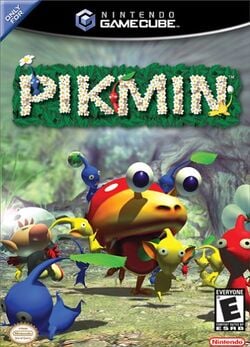
| |
| North American boxart | |
| Japanese name | ピクミン? |
| Rating | |
| Console | Nintendo GameCube |
| Developer | Nintendo EAD |
| Publisher | Nintendo |
| Genre | Real-time strategy |
| Players | Single-player |
| Saved game size | 19 blocks |
| Release date | |
| Japan | October 26th, 2001 |
| North America | December 3rd, 2001[1][2] |
| Europe | June 14th, 2002 |
| Australia | June 14th, 2002 |
| South Korea | N/A |
| Related games | |
| Successor | Pikmin 2 |
| Re-release | New Play Control! Pikmin Pikmin 1 (Nintendo Switch) |
- "Pikmin 1" redirects here. For the port that uses this name, see Pikmin 1 (Nintendo Switch).
Pikmin is the first game in the Pikmin series, released in 2001 as one of the first games available for the GameCube. The game is the first in the series chronologically, and sees Captain Olimar crash-landing on an unknown planet and collecting his missing ship parts in order to escape. The game introduces the main game mechanics of growing Pikmin, controlling the Pikmin as a group, taking down obstacles, carrying objects, and battling enemies. The game has been ported to the Wii under the title New Play Control! Pikmin, and ported to the Nintendo Switch under the title Pikmin 1. Its sequel, Pikmin 2, was released three years later in 2004.
Plot[edit]
Captain Olimar, a pilot, flies his spacecraft, the S.S. Dolphin, through space. Suddenly, a meteor hurdles toward his direction and hits the Dolphin, sending it plummeting toward an Earth-like planet. During the fall, the Dolphin ignites, and its various parts are released from the hull and scattered across the planet.
The next morning, Olimar regains consciousness on The Impact Site and turns around to find the Dolphin badly damaged. Realizing that the oxygen on the planet is deadly to his body and his life-support systems only have enough power to last 30 days, Olimar sets out to locate the missing parts of the Dolphin, hoping he can rebuild his ship and return to his home planet of Hocotate.
After exploring a bit, Olimar finds a dormant Onion. Upon approaching it, it springs to life, and out comes a seed. Upon plucking it and experimenting with the creature by throwing it, dismissing it, etc., he learns about the Pikmin and their abilities. With the help of the Red Pikmin he raises, Olimar recovers the Main Engine, which allows him to at least hover above the surface during the night, which he later learns is too dangerous.
Olimar and the Pikmin then discover a new area, The Forest of Hope and the Onion within: the Yellow Pikmin's Onion. In addition, he gradually learns more about the various enemies and quirks of the planet, and how to use each Pikmin type's abilities to their full potential. As he gathers more parts, he eventually manages to discover The Forest Navel, the Blue Pikmin, The Distant Spring, and The Final Trial. After defeating the Emperor Bulblax and recovering the final ship part, Olimar sails back to Hocotate.
Endings[edit]
| Click [show] to display the image. |
|---|
- See also: Completion.
There are three possible ways for Olimar's adventure to end, which depend on the ship parts the player can gather before the days run out. Videos of each ending can be found on the external links section of this article.
The canon ending is the best one; this is when all thirty ship parts are recovered within the thirty day time limit. After the Secret Safe is gathered, the camera zooms into the Dolphin and Captain Olimar jumps with joy. Then the scene darkens, becoming night, Olimar walks to his ship and stops to look at the Pikmin one last time. The Pikmin tilt their heads in curiosity. Olimar gives the Pikmin a short wave good-bye, to which the Pikmin tilt their heads in the opposite direction. With a sigh, Olimar looks down and shakes his head. He then boards the Dolphin and lifts off successfully, and the Pikmin attack a nearby Spotty Bulborb on their own. Next, the ship is seen flying away, with Onions of many, unseen colors following him. After the credits, the enemy reel is shown.
The neutral ending is when the time runs out, but Olimar manages to escape with the ship parts he collected. Out of the 30 parts, only 25 specific ones are necessary for the captain to return to Hocotate. The five optional parts are the Nova Blaster, the Space Float, the Massage Machine, the UV Lamp and the Secret Safe. With this ending, at the night of the final day, Captain Olimar walks towards the Dolphin and takes a quick glance back before entering the cockpit of his ship and attempting to blast off. He successfully flies off while three Pikmin (one red, one yellow, and one blue) look up into the sky with curiosity.
The bad ending takes place when Olimar does not manage to retrieve the 25 mandatory parts. On his last day, he realizes that time is up and attempts to lift off. Immediately after taking off, the engine explodes and his ship crashes back onto the planet. The Pikmin carry his unconscious body to an Onion, making Olimar pop out as a Pikmin-like creature, having his normal head, but the sprout of a Pikmin with a black stem, and without his spacesuit helmet.
It is known that the best ending is the canon one, seeing as in Pikmin 2, Olimar has brought a souvenir home for his son, and the best ending is the only one where he would have time to pick one up. In addition, it's revealed that Olimar's wife eventually finds the Secret Safe during his absence, and that ship part can only be retrieved after all other 29 were. Naturally, the worst ending is not canon, as Olimar is known to return safely to Hocotate at the start of the second game.
Gameplay[edit]
Pikmin is a three-dimensional strategy-based game, in which the player is given control of Olimar, who in turn has control over the Pikmin that follow him. The goal of the game is to find and collect as many of his 30 lost ship parts as possible, in fewer than the 30 days Olimar has to live, so that he can escape the planet before his life-support system fails. This is achieved by directing Pikmin to carry the parts to Olimar's ship. 13 minutes and 30 seconds are spent on its surface each day; as nightfall approaches, he must gather stray and toiling Pikmin so that they don't fall victim to the voracious nocturnal predators, such as the Spotty Bulborb.
In Pikmin, players will face many obstacles in order to secure the parts required to rebuild the ship. This must be done with care, as many obstacles are hazardous to the Pikmin, such as water, fire and explosions. There are also other things that block the way, such as walls, bridges and gaps. Many different animal species on the planet hinder the progress of working Pikmin. However, the forces are limited; Olimar can only have up to 100 Pikmin out in the field and no more under any circumstances. The rest are stored in the Onions, considered by Olimar to be some sort of mothership for the species.
The primary way to control Pikmin is to throw them at targets, although they can also be issued to them. By gathering resources back into the Onions, new seeds will pop out, which increase the supply of Pikmin. The creatures can also mature with the likes of nectar.
Challenge Mode[edit]
- Main article: Challenge Mode in Pikmin.
In addition to the regular story mode, there is an alternate game mode where players are challenged to grow the most Pikmin they can in a single day, with slightly different rules. The player's top 5 scores for each area are saved.
Content[edit]
Pikmin[edit]
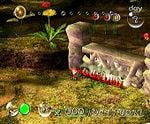
- Main article: Pikmin family.
Pikmin are the plant/animal hybrids that are discovered by Captain Olimar when he crash-landed on the planet. The Pikmin willingly follow his orders and imitate his movements, despite whatever fate may await them. Each species of Pikmin has weaknesses and strengths and all Pikmin must be used in cooperation in order to collect all of the missing ship parts. These are the types of Pikmin encountered in this game.
Red Pikmin[edit]
- Main article: Red Pikmin.
Red Pikmin are the first type of Pikmin encountered by Captain Olimar, at The Impact Site. They are used to retrieve the Main Engine, since they are the only Pikmin he has at the time. Red Pikmin are resistant to fire and have more attack power than the other Pikmin types. Besides their color, they can also distinguished from other Pikmin types with their pointed nose-like growth.
Yellow Pikmin[edit]
- Main article: Yellow Pikmin.
Yellow Pikmin are the second Pikmin discovered by Olimar, found in The Forest of Hope. Yellow Pikmin are the only Pikmin with the ability to carry bomb-rocks (in this game), and can be thrown higher than normal. The Yellow Pikmin's defining physical characteristic is their large ears.
Blue Pikmin[edit]
- Main article: Blue Pikmin.
Blue Pikmin are the third and last kind of Pikmin found in the game. They are located in The Forest Navel. Blue Pikmin are the only species of Pikmin that can move around in bodies of water, thanks to their gills. When non-Blue Pikmin fall in the water, Blue Pikmin will run to them and throw them out of the water, saving their lives.
Characters[edit]
Captain Olimar[edit]
- Main article: Captain Olimar.
Captain Olimar is the main character of Pikmin.
Areas[edit]
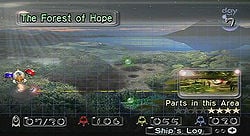
The explorable area of the planet is split into five different areas. After 1, 5, 12 and 29 ship parts are recovered, the S.S. Dolphin receives an upgrade, which allows it to fly to an additional area. The following list of areas is ordered from the first one unlocked to the last.
- The Impact Site: a small and peaceful area where Captain Olimar first lands.
- The Forest of Hope: a temperate forest-like area.
- The Forest Navel: an underground area, with a beach and some rimstone dams.
- The Distant Spring: a large wetland-like area.
- The Final Trial: a linear challenge-like level where the player's knowledge is put to the test.
Ship parts[edit]
- See: Ship part
Ship parts are what the player needs to collect in order to advance with the game. There are 30 in total, and they can upgrade the S.S. Dolphin once certain amounts of parts are recovered. Each ship part is unique, and 5 of them are not required for Olimar to succeed in his escape.
Enemies[edit]
- See: Enemies in Pikmin
There are a number of creatures in the planet that are enemies to the Pikmin. They are mostly predators, although almost all of them can be killed by large armies of Pikmin.
Plants and fungi[edit]
- See: Vegetation in Pikmin
A few decorative plants and fungi exist in each area. Most of them are plants in the real world.
Controls[edit]
- See: Controls in Pikmin
Players control the game with a GameCube controller. In-game, they take control of Olimar, and if he has any Pikmin on his group, he can control them to some degree by shifting the group's position, dismissing them, or throwing them. The player is also given some control over the camera.
Lists[edit]
Quotes[edit]
- See: Olimar's voyage log
- See: Olimar's monologs
Soundtrack[edit]
- See: Music in Pikmin
- See: Pikmin World
Easter eggs and secrets[edit]
- See: Easter eggs
Regional differences[edit]
- See: Region
Mistakes[edit]
- See: Mistakes
Glitches[edit]
- See: Glitches in Pikmin
Prerelease information[edit]
Unused content[edit]
History[edit]
Development[edit]
|
To do: Expand this section. This video has some useful information and sources. Also, Ask the Developer Vol. 10 |
During development of the GameCube, a tech demo was created that showed off multiple Marios, under the title Super Mario 128. This demo demonstrated the console's ability to have several dozens of individual objects on-screen at once. This concept was later recycled and lead to the creation of Pikmin.
While experimenting with the idea for a game, Nintendo came up with a concept of a god-related game. According to an interview with Shigeru Miyamoto, it would feature the player character as a god, looking over two humans – then called Adam and Eve – that would develop by themselves. They would multiply over time, and depending on the player's decisions, the characters could do things such as fight, or nest and have children. Eventually, it was deemed too uninteractive, and Pikmin were added. Soon after, the whole idea was scrapped, and development for Pikmin began. The Spotty Bulborb, which originated as a mammoth-like creature in that game, was re-used for Pikmin.
The first reveal of the Pikmin project came in E3 2001, where Shigeru Miyamoto played the game live. By that point, the general mechanics resembled the final product, but several assets, resources and quirks were different.
Releases[edit]
- Main articles: Region and Nintendo Selects.
The game was released on October 26th, 2001 in Japan, December 3rd, 2001[1][2] in North America, and June 14th, 2002 in Europe and Australia. In North America, the game was originally planned to release as a GameCube launch title on November 11th, 2001,[source needed] however it was delayed for unknown reasons and was released on December 3rd instead. The game was later re-released with different packaging.
There are three versions of the software, listed below. Each physical release can have the Japanese, American, or European game disc inside. The Japanese version of the game is only available in Japanese, the American version is only available in English, and the European version of the game is available in English, European French, German, Italian, and Castilian Spanish.
Below is a complete list of all known releases of Pikmin, including the box art, release locations, and product information.
New Play Control! Pikmin is a different game, but an enhanced port of this one. It was released for the Wii, and features a new control method and other slight differences.
On June 21st, 2023 a Nintendo Switch port of the game based on the New Play Control! version was released, albeit with a number of changes.
Versions[edit]
- Main article: Region.
The first version of the game, the "Japanese version", was released for the GameCube in Japan, in October of 2001. Throughout the next months, the localization team of Nintendo of America changed the game for release in North America. Finally, later, Nintendo of Europe made their own tweaks, and released that version in Europe and Oceania. Although these three regions received a different version each, the differences between them are minor. The biggest one is that the Japanese version uses Japanese text, while the others use English or European-language text. Not much changes between the US and the European versions, but it became possible to skip the sunset cutscene in the European version.
Below is a complete list of all of the different software versions of the game.
Reception[edit]
Pikmin received mostly positive reviews. Sites like IGN and GameSpot gave it scores close to 90%, praising its uniqueness and visuals, but complaining about the camera.[3] On its first week, it sold over 100,000 copies, although the numbers started decreasing in the following weeks. The song Ai no Uta helped boost sales, and became an unexpected hit, even surpassing the sales for the game itself.
Connections to other games[edit]
- See also: Canon.
This is the first game in the series, both in terms of releases, and in terms of plot timeline. The story of Pikmin 2 takes place directly after Olimar's return from his adventure in Pikmin. Other than that, Pikmin is alluded to in other games of the series, whenever Olimar's first voyage and original discovery of the Pikmin are referred. The story of Pikmin 4 is in some ways a retelling of the story of this game.
Credits[edit]
- See: Pikmin credits
Gallery[edit]
- See also: Promotional material in Pikmin.
Player's Choice box art.
Trivia[edit]
- Page 23 of the instruction manual describes a strategy against Spotty Bulborbs, but contains a typo: it has "holdung on to the feet" instead of "holding on to the feet".
- Some of the resources used for the scenery in the game come from the mountains and the gardens around Shigeru Miyamoto's house.[4]
- It is possible to collect all 30 ship parts in 6 in-game days. Such a playthrough is known as a 6 day run.
Names in other languages[edit]
| Language | Name | Meaning | Notes |
|---|---|---|---|
| ピクミン? Pikumin |
Pikmin | ||
| 皮克敏 | - | Transliteration | |
| Pikmin | - | Name taken from the official Pikmin website. | |
| Pikmin | - | ||
| Pikmin | - | ||
| Pikmin | - | ||
| Pikmin | - |
See also[edit]
External links[edit]
- Official Japanese website
- Wikipedia's article on Pikmin
- StrategyWiki's article on Pikmin
- NintendoWiki's article on Pikmin
- Pikmin game manual (Australian copy)
- Pikmin game manual (Japanese copy)
- YouTube video of the good ending
- YouTube video of the neutral ending
- YouTube video of the bad ending
References[edit]
- ^ a b "03-Dec-2001". Nintendo of America. Nintendo. Archived from the original on February 19, 2002. Retrieved May 23, 2023.
- ^ a b "coming december 3, 2001";
img_area_5.jpg(alt text). Pikmin.com. Nintendo. Archived from the original on October 24, 2001. Retrieved May 23, 2023. - ^ GameCube at E3: The Goods and the Bads on IGN, published on June 21st, 2012, retrieved on August 8th, 2020
- ^ YouTube video where Miyamoto explains the resource's origins (at 11:11)
| Games | |
|---|---|
| Main games | Pikmin • Pikmin 2 • Pikmin 3 • Pikmin 4 |
| Spin-off games | Hey! Pikmin • Pikmin Bloom |
| Re-releases | New Play Control! Pikmin • New Play Control! Pikmin 2 Pikmin 3 Deluxe • Pikmin 1 (Nintendo Switch) • Pikmin 2 (Nintendo Switch) |
| Web games | Pikmin.com SpaceForce • Pikmin Treasure Hunt • Pikmin Finder |
| Super Smash Bros. series | Brawl • for Nintendo 3DS and Wii U • Ultimate |
| Others | Pikmin Adventure (Nintendo Land) • Stage Debut |
